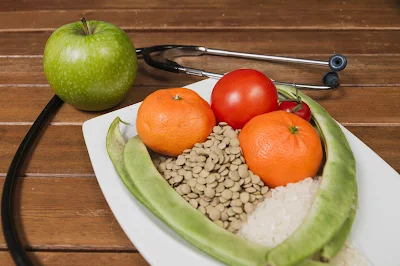Introduction:
Non-communicable diseases (NCDs), including diabetes, cardiovascular diseases, hypertension, and certain cancers, have become a pressing public health challenge in Pakistan. Among these, diabetes stands as one of the most prevalent and rapidly growing chronic conditions, affecting millions of people across the country. Poor dietary choices, sedentary lifestyles, and lack of awareness about nutrition are key contributors to the rising burden of diabetes and other NCDs in Pakistan.

This article delves into the critical role of nutrition in preventing diabetes and other non-communicable diseases, highlights the challenges specific to Pakistan, and provides actionable strategies to address this growing health crisis.
The Growing Burden of Diabetes and NCDs in Pakistan:
As of recent estimates, Pakistan ranks among the top ten countries with the highest prevalence of diabetes. According to the International Diabetes Federation (IDF), 33 million adults in Pakistan are living with diabetes, and this number is projected to rise significantly in the coming years. Additionally, NCDs account for approximately 58% of all deaths in Pakistan, with diabetes, cardiovascular diseases, and obesity being the most commonly reported conditions.
Key Drivers of the Diabetes Epidemic in Pakistan:
Poor Dietary Habits: High consumption of sugar, refined carbohydrates, unhealthy fats, and processed foods has contributed to the rising rates of obesity and diabetes.
Physical Inactivity: Urbanization and sedentary lifestyles have reduced physical activity levels, further increasing the risk of NCDs.

Genetic Predisposition: People of South Asian origin, including Pakistanis, are genetically more prone to developing type 2 diabetes.
Lack of Awareness: Limited knowledge about the importance of balanced diets and the risks associated with diabetes exacerbates the problem.
Economic Barriers: Many low-income families rely on cheap, calorie-dense, and nutrient-poor foods, increasing their susceptibility to diabetes and other NCDs.
These factors underscore the urgent need for preventive strategies, with a focus on nutrition playing a pivotal role.
Understanding the Link Between Nutrition and Diabetes Prevention:
Nutrition is a cornerstone in the prevention and management of diabetes and other NCDs. A healthy, balanced diet can help maintain optimal blood sugar levels, reduce the risk of obesity, and mitigate other risk factors associated with chronic diseases.
Key Nutritional Goals for Diabetes Prevention:
Weight Management: Maintaining a healthy body weight through calorie balance is critical for reducing the risk of type 2 diabetes.
Blood Sugar Control: Choosing foods with a low glycemic index (GI) can help stabilize blood sugar levels.
Heart Health: Limiting unhealthy fats and sodium while increasing intake of heart-healthy fats and fiber can reduce the risk of cardiovascular complications.
Nutrient Sufficiency: Ensuring adequate intake of essential vitamins, minerals, and antioxidants supports overall health and disease prevention.
Key Dietary Recommendations for Preventing Diabetes and NCDs:
The following dietary strategies can play a significant role in reducing the risk of diabetes and other NCDs in Pakistan:

1. Reduce Sugar and Refined Carbohydrates:
Pakistan has one of the highest per capita sugar consumption rates globally, with sugary beverages, desserts, and refined carbohydrates being staples in many households.
Actionable Tips:
*. Replace sugary drinks with water, herbal teas, or sugar-free alternatives.
*. Limit consumption of white bread, rice, and sweets, opting for whole grains like brown rice, whole wheat, and oats.
*. Avoid adding excessive sugar to tea and desserts.
2. Incorporate Whole Grains and High-Fiber Foods:
Whole grains and fiber-rich foods promote better digestion, stabilize blood sugar levels, and provide long-lasting energy.
Actionable Tips:
*. Add whole wheat roti, brown rice, barley (jau), and quinoa to daily meals.
*. Increase intake of legumes (lentils, chickpeas, and beans) and seeds.
3. Focus on Healthy Fats:
Trans fats and saturated fats, commonly found in fried foods and processed snacks, contribute to obesity and cardiovascular diseases.
Actionable Tips:
*. Make use of heart-healthy oils such as canola or olive oil.
*. Include foods high in omega-3 fatty acids, like walnuts, flaxseeds, and fish (sardines, salmon).
*. Avoid deep-fried snacks and replace them with baked or air-fried options.
4. Increase Fruit and Vegetable Intake:
Fruits and vegetables are rich in antioxidants, vitamins, and minerals that help combat oxidative stress and inflammation, reducing the risk of NCDs.
Actionable Tips:
*. Aim for at least 5 servings of fruits and vegetables daily.
*. Choose seasonal and local produce, such as oranges, guavas, spinach, and okra.
*. Use vegetables to replace calorie-dense side dishes like fries or bread.
5. Control Portion Sizes:

Overeating, even healthy foods, can lead to weight gain and disrupt blood sugar levels.
Actionable Tips:
*. Use smaller plates to control portion sizes.
*. Avoid second helpings and eat mindfully to recognize fullness.
*. Follow the “half plate rule,” where half your plate is filled with vegetables or salad.
6. Limit Salt Intake:
Excess sodium intake is a major contributor to hypertension, a common comorbidity of diabetes.
Actionable Tips:
*. Reduce the use of table salt and avoid processed foods like chips and canned goods.
*. Use herbs and spices (turmeric, cumin, coriander) to flavor food instead of salt.
7. Stay Hydrated:
Maintaining blood sugar levels and general health requires adequate fluids.
Actionable Tips:
*. Drink at least 8-10 glasses of water daily.
*. Avoid sugary and artificially sweetened drinks.
Challenges in Promoting Nutrition for Diabetes Prevention in Pakistan:
Despite the clear link between nutrition and diabetes prevention, there are several barriers to implementing effective dietary interventions in Pakistan:

Cultural Dietary Preferences: Traditional Pakistani meals often include calorie-dense foods like biryani, parathas, and sweets.
Economic Constraints: Fresh fruits, vegetables, and lean proteins are often unaffordable for low-income families.
Lack of Awareness: Many people are unaware of how dietary choices impact their risk of diabetes and NCDs.
Urbanization and Fast Food Culture: The growing trend of fast food consumption among the urban population promotes unhealthy eating habits.
Weak Policy Implementation: Although Pakistan has policies targeting NCDs, enforcement and public health campaigns remain inadequate.
Strategies to Promote Nutrition for Diabetes and NCD Prevention in Pakistan:
Pakistan's diabetes epidemic calls for a multifaceted strategy that involves communities, people, and authorities.

1. Public Awareness Campaigns:
*. Educate the public about the importance of balanced nutrition through mass media, community workshops, and school programs.
*. Emphasize the risks associated with unhealthy fats and too much sugar.
2. Improved Food Policies:
*. Enforce regulations to limit the availability of sugary drinks and trans fats.
*. Subsidize healthy food options to make them accessible to low-income households.
3. School-Based Nutrition Programs
Introduce healthy meal plans and educate children about the benefits of balanced diets.
4. Community Engagement:
*. Encourage community-based initiatives like kitchen gardening and healthy cooking classes.
*. Partner with religious institutions to promote healthy eating during events like Ramadan.
5. Healthcare System Integration:
*. Train healthcare professionals to provide nutrition counseling as part of routine consultations.
*. Establish diabetes prevention clinics focusing on dietary interventions.
.jpg)
Conclusion:
The rising prevalence of diabetes and other non-communicable diseases in Pakistan underscores the urgent need for preventive measures. Nutrition plays a pivotal role in combating these chronic conditions, offering a cost-effective and sustainable solution to reduce their burden. By promoting healthier dietary habits, increasing public awareness, and implementing supportive policies, Pakistan can address the root causes of diabetes and NCDs.
Collective action from individuals, communities, and the government is essential to achieve this goal. Embracing a nutritious and balanced diet is not just a personal choice but a national priority that can pave the way for a healthier future for all Pakistanis.








0 Comments